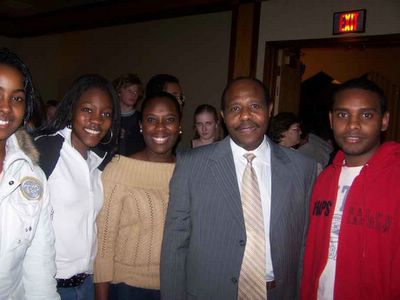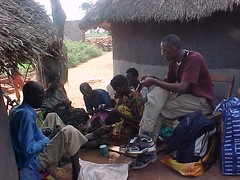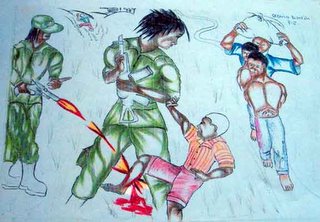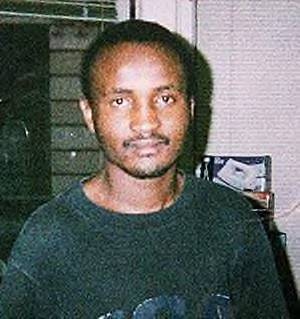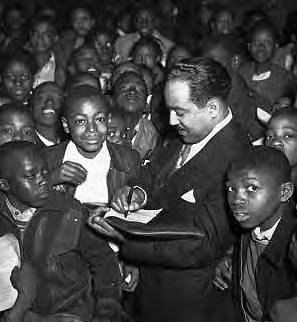
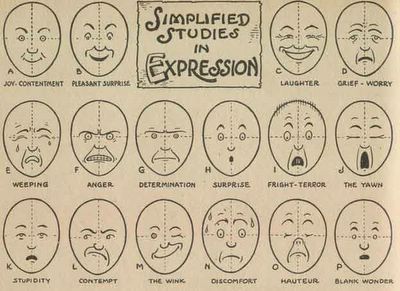
Blank Wonder
I haven't posted on this blog for a while. I've been posting on my tribe.net blog called Incompentent Gardener, but haven't been writing about gardening rather posts in re Black History Month. The last post here was a cross-post and I realised that didn't work very well. This blog is in a general sense a blog about service to African people. It's too easy to skip posting here because I always have anxiety when opening Blogger about just what I will write about. That anxiety usually goes away when I start writing, but I remember it nonetheless and avoid opening Blogger!
Several authors of the blogs I read have expressed anxiety about blogging on their blogs. I was quite disturbed that a local blogger announced in a post that it was over, through, done. That blog is important to me because I have similar political views and we both seem to have a love--hate relationship to the Pittsburgh Post-Gazette. Procrastinate as I do, it wasn't to the next day that I went to the blog to leave a comment to the effect of "Please don't go" and discovered that the "chuck it all" post had been deleted. Lately he's been experimenting with posts, but mostly I like the ones that fall in the old and regular rhthym.
Regardless of political leanings most of us long-tail bloggers seem an idealistic lot. We imagine that blogs can be a way of connecting to make good things happen. Blogs do connect people, but it's different than I had (vaguely) in mind. I expected some of my friends to read this sometimes, and some of them do, but different friends than I expected.
Recently I chatted with a Vietnamese college student in Vietnam. He told me about his Yahoo 360 blog. It took me a while to get around to checking it out and when I looked over his archives I discovered a post about me. The effort to get Nathan a computer had moved him. In his post on his blog, but not in our chats, he wrote that I need to post my blog address and email on my Yahoo 360 because many would be interested. I still haven't gotten around to posting much on my page there. I had no idea my friend was reading the Bazungu Bucks blog and I certainly never considered a network of Vietnamse young people reading it.
As a middle-aged guy and late adopter to computers and the Internet, I'm so slow to figure stuff out. I've often been jealous of the way young people do stuff with computers. They seem to me fearless and show each other how to do stuff. Doing a blog seems a lot like learning that way.
At tribe.net an English translator in Costa Rica wrote to me saying he liked my idea for Cracker Jack books and thought they had potential where he is. Oh great! Now it's a process of trying to figure out what to work on and what to say to him. But right away, he offers a good name for these books: Microlibros. He's also worked with some formatting issues. There are so many issues to think about with these books, but that process is immediately made better with someone to share ideas with.
Content and making it as easy as possible for regular people to make content for these microlibros are an important challenge. I have some ideas for microlibros I'd like to author. Some of these are plans to construct simple and useful furniture. The problem is that it's a real challenge for me to draw these designs and I've been lazy about doing that. But along those lines in the back of my head are some designs in exisitng books. In particular I was looking for a Depression-era book on making useful items out of tin cans. I can't find it and I think it likely that I already sent it off to Africa. Nevertheless I found a book, Draw Comics! --Here's How-- by George Leonard Carlson. Simplifies Studies in Expression seemed an example of the sorts of things that would make a good microlibra. And of all the expressions studied, Blank Wonder sure is swell.
Thursday in Uganda was election day. All week I've been reading about Ugandan politics, and all week feeling dredful about it. I have a bunch of links about the election, but I can't quite bring my thoughts together for comment.
This post at Kenyan Pundit about the Ugandan elections reminds me what a great blog that is. 'Rumormongers' is a post by Abraham McLaughlin of The Christian Science Monitor. The Monitor is a very good newspaper with a very Web-friendly presence. I'm very happy with the way the paper allows space for reporters to blog. McLaughlin's blog posts compliment his excellent reporting from Africa by providing context to his full-blown reports.
Neither of these posts put the whole Ugandan election in perspective. Today's Post-Gazette reported on the election in the News Briefs. That makes sense really because who has the time to concern themselves with the internal politics of countries around the world in any detail. That sort of headline news serves a useful purpose, but it's good to be reminded how much of the story headlines miss. Blogs are very useful for gaining a fuller appreciation of situations around the world.
Juergen Kikuyumoja Eichholz's Kikuyumoja's Realm, has a review of Hubert Sauper's film Darwin's Ghost. The shorter version is he gives it a thumbs up. I hope I get to see it. Juergen is a German Kenyan blogger who blogs in English. There's something in that combination that makes me glad and a little optimistic.
Finally, Afromusing has a post about tree planting. Keguro at Gukira picked up on it right away. I think this is very important for a couple of reasons off the top of my head. First is the fact that many of us bloggers are trying to use our blogs to create something good and bring others onboard. Most of the time it seem impractical and doesn't work out the way we think it will, and still things happen. In any case I'd love it if this idea sprouts wings. Second Nathan from the very beginning has identified tree planting as a priority for the BSLA. Small efforts by many can help jump start worthwhile projects.
All along this blog has been a study in the expression of Blank Wonder. Thanks to George Leonard Carlson for the illustration--circa 1933. I don't know what I'm doing, but I know I'm learning along the way.

